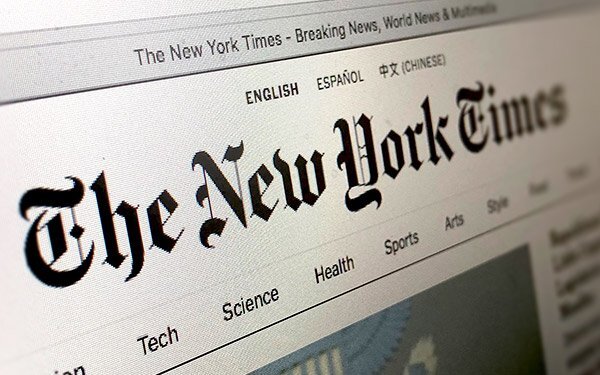

Over at “Get Religion,” veteran religion writer Terry Mattingly responds to my recent Current piece “The New York Times’ ‘Come to Jesus’ Moment.”
Here is a taste:
…This brings us to a rather short John Fea “think piece” essay that recently ran at Current: “The New York Times’ ‘Come to Jesus’ Moment.” Here is the overture, which is SURE to cause discussions to GetReligion readers who are up and running on the weekend:
“For decades I have listened to evangelical Christians disparage the opinion page of The New York Times. They say it’s too liberal. It’s run by secular elites. It’s anti-Christian. Its writers don’t understand religion. But those who continue to make these claims may want to take another look. In the last decade the Times has become a bastion of American pluralism, and that means it has welcomed the opinions of Christians — yes, even evangelical Christians — to the mix.”
A decade of diversity in religious and moral worldviews in the hallowed op-ed pages of the Times?
Uh, I’m not sure about that. However, it’s clear where his line of thinking is headed (#triggerwarning):
“The most recent development on this front is the Times’ decision to publish a regular column by David French. French is an Army veteran, a former religious liberty lawyer, and the National Review writer whom neoconservative Bill Kristol tried to tap as a possible third-party candidate to run against Donald Trump in 2016. He is a member of the theologically conservative Presbyterian Church in America, is pro-life on abortion, and is opposed to same-sex marriage. He is married to Nancy French, a ghostwriter for Sarah Palin, Bristol Palin, Ben Sasse. It doesn’t get more evangelical than this.”
“French no doubt attracted the power brokers at the Times with his wildly popular newsletters at The Dispatch. The moral clarity of these pieces, especially his stinging criticisms of Trump, MAGA evangelicals, Christian nationalism, and Black Lives Matter opponents, infuriated many of his fellow evangelicals. French often ended these pieces with YouTube videos of his favorite evangelical worship songs.”
This leads us to the expanded online world of the sort-of Times op-ed roster, which exists primarily in digital ink.
“French joins two other evangelicals who appear regularly at the Times opinion page: Tish Harrison Warren and Esau McCaulley. Warren is a graduate of the evangelical Gordon-Conwell Theological Seminary and was a former staff member of InterVarsity Christian Fellowship at Vanderbilt University, where she fought for the campus ministry’s right to reserve student leadership roles for Christians. She is a priest in the evangelical-oriented Anglican Church of North America, a conservative fellowship of churches that left the Episcopal Church in the United States in response to the denomination’s liberal theology and views on sexual ethics. Last week Warren devoted her Times newsletter to an interview with Oxford University New Testament scholar N.T. Wright. The topic was Wright’s defense of Jesus Christ’s bodily resurrection.
And speaking of N.T. Wright, McCaulley was one of his doctoral students. He teaches New Testament at Wheaton College, the flagship liberal arts institution of American evangelicalism. Wheaton does not hire Roman Catholics and it requires faculty to sign a statement of faith affirming that “the Scriptures of the Old and New Testaments are verbally inspired by God and inerrant in the original writing.” Most of McCaulley’s columns deal with the African-American experience and he often brings his conservative evangelical theology to bear on these matters. Last week he too wrote about the bodily resurrection of Jesus.”
Wheaton College is, of course, a pretty complex place and has been for some time.
Two decades ago, a friend active in Republican circles in Washington, D.C., told me that — during her years studying at Wheaton — she never had a political-science professor that she would consider a religious or moral conservative. I am sure that there are other Wheaton grads who would disagree with that statement or, at the very least, want to debate it.
Anyway, the Current post does note the presence of Catholic Ross Douthat in Times op-ed land and then name-drops some links to the world of progressive evangelicalism.
This brings us to the thesis statement:
The New York Times commitment to Christian thinkers and commentators no longer seems like tokenism. These writers are helping to shape the discourse at the so-called “paper of record.”
Please discuss. And keep it clean, folks.
Is the Times becoming a more complex place that is open to the views of, well, half of America?
So what do you think about Mattingly’s question?
This comment is very much to the side of John’s post, and for that I apologize, but I can’t help noting that this, from Mattingly–“Two decades ago, a friend active in Republican circles in Washington, D.C., told me that — during her years studying at Wheaton — she never had a political-science professor that she would consider a religious or moral conservative”–is an exceedingly bizarre anecdote.
I can’t for the life of me imagine why any sober writer would include it. Besides being an anecdote–along the lines of a single entry in a faculty evaluation and therefore worthy all the skepticism such things warrant–the one expressing the judgment is described as “active in Republican circles in Washington, D.C.” as if that demonstrates their conservative bona fides.
In my experience (note the n here is one also, so, caveat emptor and all that) folk “active in Republican circles” anywhere (perhaps especially in Washington, D.C.) are going to have very different notions of what counts as “conservative” than a faithful Christian academic will, and their notions will typically assign a very large place to “loyal Republican apologist and voter” in their assessment of what counts as such.